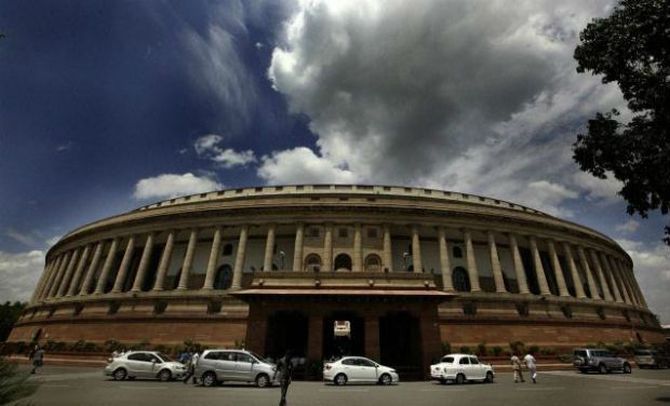Let there be a rule that if the Budget is not passed and funds cannot be drawn from the Consolidated Fund of India, there will be a government shutdown as it happens in the United States, says A K Bhattacharya.

The 2018 Budget session of India’s Parliament concluded recently, but the manner in which its business was conducted during these seven working weeks was depressing, to say the least.
This was the least productive Budget session in the past 18 years.
Even within the life of the current term of the 16th Lok Sabha, constituted in May 2014, the performance of the lower House in this Budget session was the worst.
The Lok Sabha sat from January 29 to April 6, with a short three-week recess in between, but worked for only 21 per cent of its scheduled time, according to data compiled by PRS Legislative Research.
This was much worse than the average productivity of the current Lok Sabha, which has so far worked for 85 per cent of its scheduled time.
The average productivity of the Rajya Sabha during the same period was little less at 68 per cent, but in the just-concluded Budget session the upper House worked for only 27 per cent of its scheduled time.
The time spent on discussing the Budget too was the lowest in the past 18 years.
Since 2000, on average, the Lok Sabha has been spending 53 hours to discuss the Union Budget and the Rajya Sabha has been devoting 23 hours.
But this year, the Lok Sabha spent 15 hours and 18 minutes to discuss and approve the Budget. And the Rajya Sabha spent just a little over 11 hours on the Budget.
Of particular significance is the fact that, the bulk of the time in both Houses of Parliament was used up to discuss the general Budget before the recess and the discussion on the Finance Bill and its approval took only about a few minutes.
The demands for grants for various ministries amounting to an estimated Rs 26 trillion were guillotined, which meant they too got passed without any discussion.
It is significant because this year the Finance Bill included amendments to as many as 18 other Bills.
This is unprecedented and the fact that these got passed without any discussion reflects poorly on parliamentary oversight on law making.
There are three levels where failure has taken place and nobody is even asking for fixing the problem apart from expressing great anguish over how Parliament has ceased to be functional.
The executive, in particular the parliamentary affairs minister, must explain why the government has failed to secure the smooth functioning of Parliament.
The responsibility of a smooth conduct of business in the two Houses of Parliament rests first and foremost with the government of the day.
When the Union Budget for 2013-14 also got passed without any discussion, the Bharatiya Janata Party, then in the Opposition, had argued that the Congress that led the United Progressive Alliance government was responsible for running Parliament.
Indeed, a few leaders of the BJP had then said that it was only playing its legitimate role as the party in Opposition.
Whatever be the issues over which Parliament is now being disrupted, the logic of the government’s responsibility cannot be forgotten just because the BJP is now leading the government.
Therefore, it must fulfil its responsibility by its own yardstick.
The Opposition too cannot wash its hands of the responsibility to provide constructive opposition to the government instead of letting Parliament remain disrupted for several weeks.
The Congress should introspect if it could have been more proactive and accommodating to ensure that there was at least some discussion on the Finance Bill instead of them being passed in just 18 minutes.
The responsibility for the third failure squarely falls on those who run the two Houses -- the chairman of the Rajya Sabha and the speaker of the Lok Sabha.
The chairman of the Rajya Sabha is also the vice president of India.
Both the Rajya Sabha chairman and the Lok Sabha speaker must perhaps insist on credible action from the government to bring the Opposition around to help conduct smooth business in the two Houses.
So, what is the way out of this logjam resulting in obvious sub-optimal outcomes in terms of governance? Legislators cannot be permitted to get off scot-free from their primary responsibility of discussing and debating the proposals for government expenditure and taxation policy changes.
Such a process is all the more important if, as it happened this year, the Finance Bill has provisions for amending laws that don’t strictly fall under the domain of taxation policy.
In the 1990s, an idea was mooted to entrust the responsibility of evaluating the expenditure proposals in the Budget with standing committees of Parliament.
These committees would table their reports before Parliament and these would be discussed by members of the two Houses.
This experiment has helped ensure at least a preliminary evaluation of the expenditure proposals even though some of them were still guillotined to expedite the Budget-approval process.
But the system of standing committees of Parliament cannot ensure discussion on the provisions in the Finance Bill.
What happened this year is that the new tax proposals were enacted even though there was hardly any discussion on the Finance Bill.
Such a situation is neither a healthy practice for any parliamentary democracy nor should it be allowed to continue without immediate corrective action.
It is time parliamentarians were subjected to an accountability framework.
If parliamentarians, individually or collectively, allow the Finance Bill to be passed without any discussion, they must be held responsible and every government body dependent on funds from the Consolidated Fund of India must be made to pay for such parliamentary irresponsibility.
Remember that the government can release funds from the CFI only after Parliament approves the Budget.
So, a way out could be to enforce a rule that the Budget including the tax proposals cannot be deemed to have been passed unless these are subjected to a debate for a certain number of hours.
If all past Budgets since 2000 have been deliberated upon in the Lok Sabha for 53 hours on average, then the new rule could fix at least 50 hours of Budget debate before Lok Sabha can vote on it.
Similarly, for the Rajya Sabha, the minimum period of debate could be 20 hours, against an average discussion for 23 hours for every Budget since 2000.
And to make it work, let there be a rule that if the Budget is not passed and funds cannot be drawn from the CFI, there will be a government shutdown as it happens in the United States.
Let the people know how irresponsible their parliamentarians have become.
Today, their irresponsibility in passing the Budget without any debate goes virtually unnoticed and unpunished.
It is now time to force them to debate the Budget and if they want to avoid it, the people would know of their irresponsibility as government bodies would have shut down after March 31, the last day of the financial year.
The people’s ire will be directed at the parliamentarians and hopefully that would help them behave more responsibly.
Photograph: PTI Photo.











